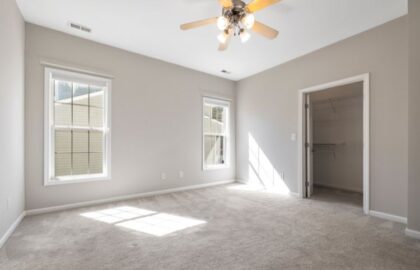
Several clients ask the question: Do property managers live onsite? According to a 2022 survey by the National Association of Residential Property Managers (NARPM), approximately 15% of property managers live on the property that they manage.
The percentage of property managers who live onsite may vary depending on a number of factors, such as the size and complexity of the property, the type of tenants, and the property manager’s preferences.
For example, property managers who manage large or complex properties may be more likely to live onsite in order to be more responsive to tenant needs and to provide security for the property.
What Is an Onsite Property Manager?
An onsite property manager is a property manager who lives on the property that they manage. This can be a residential property, such as an apartment complex or condominium building, or a commercial property, such as an office building or shopping centre.
Onsite property managers are responsible for financial and legal matters, in addition to the day-to-day operations of the property. They typically handle tasks such as:
- Monthly rent collection
- Tenant relations
- Maintenance and repairs
- Security
- Leasing vacant units
- Enforcing lease agreements
- Managing the property’s finances
onsite property managers typically live in an apartment or house on the property that they manage. This allows them to be available to tenants 24/7 and to respond to tenant needs quickly and efficiently.
Why Do Some Property Managers Live On-Site?
There are a number of reasons why some property managers live onsite, including:
- To be more responsive to tenant needs: On-site property managers can respond to tenant needs more quickly and efficiently than property managers who live off-site. This is because they are already on the property and do not have to travel to and from the property to address tenant concerns.
- To deter crime: On-site property managers can deter crime by being a visible presence on the property. They can also keep an eye out for suspicious activity and report it to the police.
- To provide security: On-site property managers can provide security for the property and its tenants. They can monitor the property’s security system, check on the property at night, and respond to any security threats.
- To save money: Property owners can save money by hiring onsite property managers. This is because they do not have to pay for the property manager to travel to and from the property.
- To maintain the property: On-site property managers can help to maintain the property by keeping an eye on it and identifying any potential problems early on. They can also help to coordinate repairs and maintenance with tenants.
- To build relationships with tenants: On-site property managers have the opportunity to build relationships with tenants by being more present and accessible. This can lead to a more positive and productive relationship between the property manager and the tenants.
In addition to these reasons, some property managers may choose to live onsite because they enjoy the lifestyle. They may appreciate being able to walk to work, having access to the property’s amenities, or being part of the community.
What Are the Benefits of Having an On-Site Property Manager?
There are a number of benefits to having an onsite property manager, including:
- More responsive service: On-site property managers are more responsive to tenant needs because they are always available on the property. Off-site property managers may not be able to respond to tenant needs as quickly, especially if they are managing multiple properties.
- Reduced crime: By being a visible presence on the property, onsite property managers can help discourage criminals from targeting the property. They can also keep an eye out for suspicious activity and report it to the police quickly, which can help to prevent crime from happening.
- Improved tenant satisfaction: A resident manager can improve tenant satisfaction by being more responsive to tenant needs and providing a more secure environment.
- Increased property value: On-site property managers can increase the value of rental properties by making them more attractive to potential tenants and buyers.
- Better maintenance and repairs: On-site property managers can better maintain the property and identify any potential problems early on. They can also help to coordinate repairs and maintenance with tenants.
- Increase occupancy rates: On-site property managers can help to increase occupancy rates by being more proactive in marketing the property and leasing vacant units.
- Reduce turnover: On-site property managers can help to reduce tenant turnover by creating a positive and supportive community for tenants.
- Improve property aesthetics: On-site property managers can help to improve the property’s aesthetics by overseeing landscaping and maintenance.
- Increase compliance with lease agreements: On-site property managers can help to increase compliance with lease agreements by being more visible and present on the property.
It’s thus not too surprising that property management companies provide this service to property owners.
What Are the Drawbacks of Having an On-Site Property Manager?
There are a few drawbacks to having an onsite manager, including:
- Less privacy for tenants: On-site property managers will have access to the property and its tenants 24/7. This can be a concern for tenants who value their privacy.
- Potential for conflict: Living on the property can create the potential for conflict between the property manager and the tenants. For example, tenants may complain about the property manager’s noise or behaviour.
- Increased costs for the property owner: Property owners will have to pay for the property manager’s housing and other expenses.
- Less flexibility for the property manager: On-site property managers may have less flexibility in their work schedule and may have to work longer hours.
- Increased workload for the property manager: On-site property managers may have a heavier workload than property managers who live off-site. This is because they may be responsible for additional tasks, such as monitoring the property’s security system and providing security for the property and its tenants.
It is important to note that the drawbacks of having an onsite property manager will vary depending on the specific situation.
For example, if the property manager is professional and respectful of the tenant’s privacy, then the potential for conflict is reduced. Additionally, if the property owner is willing to pay the property manager a fair salary and benefits, then the increased workload and reduced flexibility may be less of a concern for the property manager.
Conclusion
Having an onsite property manager can make the rental unit more attractive. That’s because it shows that the property owner is invested in maintaining the property and providing a good experience for tenants.
Whether or not to hire an onsite manager is a decision that should be made on a case-by-case basis. Property owners should weigh the benefits and drawbacks of having an onsite manager before making a decision.
Overall, having an onsite property manager can provide a number of benefits for both property owners and tenants, including increased property value.







